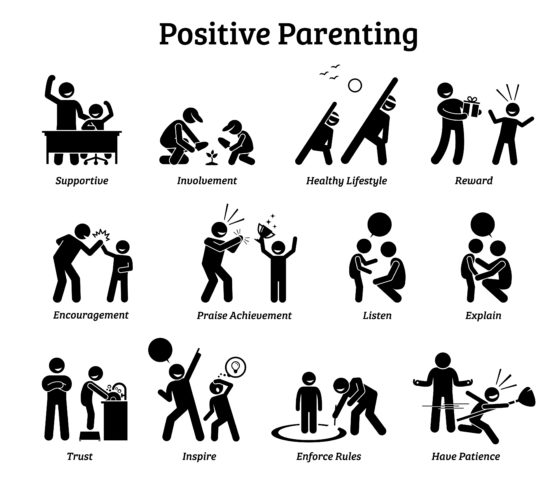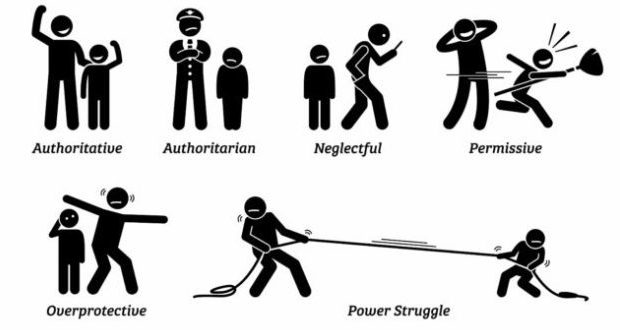Four Types Of Parenting Styles
Assessing your parenting style provides you with an opportunity to gain invaluable insight into the interactions you have with your children. Your parenting style can affect every aspect of your child’s life.
For example, the way you discipline and interact with your child will influence everything from their weight to their self-esteem. These effects are likely to stay with them long into adulthood. Therefore, it’s important to make certain your parenting style is supportive of your child’s growth and development.
Diana Baumrind, a developmental psychologist at the University of California-Berkeley in the 1960s, is largely responsible for the parenting styles commonly used in psychology today. Upon observing over 100 preschool children, Baumrind noticed a pattern in the different behavior the children displayed.
Each distinctive type of behavior was found to connect to a specific type of parenting. She identified these parenting styles as authoritarian, permissive, or authoritative. Maccoby and Martin expanded upon the parenting styles model in the 1980s, adding a fourth style (uninvolved/neglectful).
Baumrind’s theory, supported by Maccoby and Martin’s research, is that different parenting styles can lead to different child behavior and development types.
Types of Parenting Styles psychologists recognize today are:
- Authoritarian or Disciplinarian
- Uninvolved or Neglectful
- Permissive or Indulgent
- Authoritative

Authoritarian Parenting
It is also known as disciplinarian parenting and can be identified by two apparent characteristics: high levels of parental control and low levels of responsiveness to their children’s needs.
Authoritarian parents demand blind obedience from their children.
Disciplinarians only allow one-way communication, often through the use of strict rules. Any attempts from the child to rationalize with this type of parent are seen as disrespectful backtalk. They are not interested in negotiating.
Stern discipline and harsh punishments, such as physical punishment, are often-used tools by these parents. Authoritarian parents see these “tools” as an effective means to control children’s behavior.
Their disciplinary methods are typically coercive, peremptory, and deeply concerned with exerting and maintaining their dominant status in the household.
Authoritarian parents tend to lack a nurturing nature and often justify their deficiency of responsiveness to their children’s needs as necessary “tough love.” They have unrealistic expectations of their children. These parents demand their children behave exceptionally well; mistakes are not tolerated.
However, the authoritarian parent does little to provide any direction to their children to avoid making misjudgments. Mistakes are harshly punished, and the children are often left wondering what they did wrong.
Children with these strict parents do tend to follow the rules. Still, their obedience comes at a price: because they have been repeatedly shown their opinions are not valued, they’re at a higher risk of exhibiting low self-esteem – among other things.
Characteristics of Children with Authoritarian Parents
- Be melancholic.
- Have trouble developing independence.
- Be insecure.
- Demonstrate more behavioral problems, often stemming from anger towards their parents.
- Struggle academically.
- Exhibit poor social skills.
- Be prone to issues with mental health.
- Have a higher likelihood of developing drug use problems.
- Express poor coping mechanisms.
- Struggle with communication, which can lead to skillful lying

Uninvolved Parenting
Uninvolved or neglectful, parents can be identified by three clear characteristics:
Absence of firm boundaries,
A lack of high standards, and
Poor communication between the parent and the child.
In a household managed by an uninvolved parent, there tend to be very few rules – and those rules are rarely enforced. These parents don’t ask their children about school or homework.
They don’t spend much time with their child and are not likely to know their child’s whereabouts or who they are with. Children may essentially be expected to raise themselves.
While these parents may provide food and shelter, they’re very detached and are, at best, indifferent to the needs of their children. In extreme cases, these parents may even fail to provide the most basic needs of their children, such as food and shelter.
The neglectful behavior sometimes displayed by uninvolved parents isn’t always intentional. These uninvolved parents may struggle with mental health or substance abuse issues, making it difficult to provide for their children despite having a desire to do so.
In addition, the uninvolved parent may have been a victim of abuse as a child. And, in an attempt to avoid repeating this pattern of violence, they have disconnected from their child. This parenting style could also stem from other problems, such as financial difficulties.
Characteristics of Children with Uninvolved Parents
- Tend to be unhappy.
- Have low self-esteem.
- Perform poorly academically.
- Tend to be less competent than their peers.
- They are more impulsive and lack self-control.
- Struggle to regulate emotions on their own.
- Encounter more delinquency and problems with addiction.
- They are likely to exhibit suicidal behavior, among other mental health issues.
Permissive Parenting
Permissive parents, also referred to as indulgent parents, are extremely responsive to their children’s needs but make very few demands on their children and provide a complete lack of discipline.
These are often the overly forgiving parents that are quick to make excuses for their children, usually something along the lines of: “kids will be kids.” These parents don’t expect their kids to display any level of maturity or self-control; thus, children of permissive parents rarely experience discipline.
Because they have relatively low expectations of their children, permissive parents set limited rules and are reluctant to enforce the few rules they do put in place.
Indulgent parents are warm but have insufficient boundaries. These parents detest disappointing their children. Their disdain for causing their children disappointment is so strong they will often avoid telling their children “No.”
When they do, it rarely holds any true meaning. For example, suppose a child begs or promises to be good. In that case, a permissive parent will quickly reinstate previously lost privileges before the child has had the chance to understand the consequences of their actions. These are the parents that easily give in to their children’s will: the pushovers.
Permissive parents would rather take on a friendship-type role than that of a parental one. Thus, it isn’t uncommon for indulgent parents to encourage their children to talk with them about their problems. Still, these parents seem to forget the importance of discouraging poor choices and bad behavior as well.
This parenting style is common among parents from authoritarian households. In the hope of providing an environment where their children feel free to make their own decisions and feel their opinions are valued, vastly different from what they experienced themselves as children, permissive parents tend to overcompensate.
It isn’t unusual for parents to feel guilt after a divorce or worry about how children cope with the change. This guilt may weigh more heavily on some parents, causing them to slip into permissive parenting practices.
While parents that have adopted this style mean well, children of permissive parenting tend to have the worst outcomes. Out of the four groups, they’re the most likely to struggle with behavioral problems, as it is typical for these children to have a complete disregard for authority.
These children are also at a higher risk for health problems, such as obesity, due to permissive parents’ tendency to struggle to set and maintain boundaries, limiting junk food intake. In addition, permissive parents often don’t enforce good habits, like ensuring that their children regularly practice good dental hygiene, which may put their children at a higher risk of having dental cavities.
Characteristics of Children with Permissive Parenting
- Cannot follow the rules – lack of respect towards authority figures.
- Have a lack of self-control.
- Possess egocentric tendencies.
- Struggle academically.
- Encounter more problems in relationships and social interactions.
- Report a lot of sadness.

Authoritative Parenting
Also known as democratic parents, the authoritative parents are extremely responsive to their children’s needs and use effective disciplinary measures, and have high expectations for their children.
Authoritative parents are proactive parents- investing a lot of time and energy into preventing behavioral problems. They also reinforce good behavior by using positive discipline strategies, such as praise and reward systems.
Authoritative parents combine the positive aspects of authoritarian parenting and permissive parenting styles. Like authoritarian parents, they establish rules and expect their children to follow.
However, where authoritarian parents tend to be more dictatorial, this parenting style is much more democratic. Though these parents have high expectations for achievement and maturity, they are also warm and considerate of their children’s needs, much like permissive parents.
Democratic parents set rules and enforce boundaries by having an open discussion, allowing for bidirectional communication. Authoritative parents see the importance of sharing explanations and reasoning with their children.
Explanations enable children to have a sense of awareness. This parenting style calls for guidance when helping children correct their mistakes and teaching them what they can do better in the future, not just punishing them. Their disciplinary methods are reasoned, negotiable, and outcome-oriented.
Authoritative parents are affectionate, supportive and allow their children to experience autonomy while imprinting the importance of respecting the rules. In addition, these parents take great care to make sure that their children know they matter.
In numerous studies, psychologists have found that children raised with this parenting style are the most likely to become responsible adults who feel comfortable voicing their opinions out of the four groups. Children of authoritative parents are also more likely to have excellent decision-making skills and are better at evaluating safety risks on their own than the children of the other parenting styles.
Characteristics of Children with Authoritative Parents
- Appear happy and content.
- Are more independent
- Are more active.
- Achieve higher academic success.
- Develop ideal self-esteem.
- Interact with peers using competent social skills.
- Have better mental health — less depression, anxiety, suicide attempts, delinquency, alcohol, and drug use.
- Exhibit less violent tendencies.
Which Type is the Most Effective?
Numerous studies have been conducted over the decades, all of which have led the vast majority of psychologists and psychiatrists to believe that the best parenting style is authoritative. Furthermore, research has indicated that authoritative parenting is consistently linked to the most favorable outcomes in children.
These parenting styles have been studied for over 25 years in different countries. Results have generally been the same for each parenting style; however, there are some inconsistencies and exceptions.
Some studies have found that authoritative parenting isn’t linked to the best academic achievement in all ethnic and socioeconomic backgrounds. For example, one study illustrated that the authoritarian parenting style was most effective in producing academic success in Asian-American households.
On the other hand, another study in Spain indicates that authoritative and indulgent parenting styles result in children’s ideal outcomes.
While there may be some truth to these findings, no study has conclusively disproved the benefits of authoritative parenting. On the contrary, however, a multitude of studies has consistently shown its advantages. Thus, the most effective parenting style is indeed authoritative.
Is it Important for Parents to Share the Same Parenting Style?
No two parents are exactly alike. Thus, it is common for a set of parents to have different parenting styles. For example, the mother may favor an authoritative style while the father may have a more authoritarian approach to parenting. These combinations make each family unique.
However, these differing approaches can sometimes lead to mixed signals. To create a cohesive approach to parenting, parents must strike a balance and learn to combine their parenting styles to operate as a team efficiently.
In step-parenting, experts recommend taking the lead of the biological parents when it comes to parenting styles. If you are a step-parent, adopt your partner’s parenting style.
What Parenting Style Do You Have?
Discover your parenting style here.
It is not unusual for parents to fit into more than one category of parenting styles. So don’t fret if there are times when you lean towards a more permissive parenting style and other times when you identify more strongly with another style altogether.
The research clearly illustrates that authoritative parenting is the most effective parenting style. But even if you tend to identify with the other parenting styles more, it is possible to become a more authoritative parent.
By staying committed to being the best parent you can be, you can maintain a positive relationship with your child while healthily embracing your authority. Gradually, your child will benefit from your authoritative style.
Find out if you’re a permissive stepfather here.






